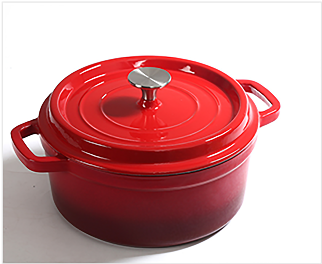
Cast Iron vs Stainless Steel Cookware Choosing the Best Saucepan for Your Kitchen Needs
Cast Iron vs. Stainless Steel Saucepans A Comprehensive Comparison
When it comes to choosing the right saucepan for your kitchen, two materials often come up for discussion cast iron and stainless steel. Both have their unique benefits and drawbacks, and understanding these can help you make an informed decision based on your cooking style and needs. In this article, we will explore the characteristics of each material, including heat retention, maintenance, versatility, and overall cooking performance.
Heat Retention and Distribution
One of the primary advantages of cast iron cookware is its exceptional heat retention. Cast iron saucepans can hold heat for extended periods, making them ideal for slow cooking and frying. Once heated, they distribute heat evenly across the surface, minimizing hot spots that can lead to uneven cooking. This property makes cast iron an excellent choice for dishes that require long cooking times, such as stews and braised meats.
On the other hand, stainless steel saucepans offer different thermal properties. While they heat up quickly, they do not retain heat as well as cast iron. This means that stainless steel pans may require more energy to maintain a steady cooking temperature. However, high-quality stainless steel cookware often features an aluminum or copper core, which helps to enhance heat distribution and responsiveness—ideal for sautéing and boiling.
Weight and Maneuverability
Weight is another important factor to consider when choosing between cast iron and stainless steel saucepans. Cast iron is notoriously heavy, which can be a disadvantage for some users, especially when maneuvering it during cooking or cleaning. However, many cooks appreciate the sturdiness and stability that a heavier pan provides on the stovetop.
In contrast, stainless steel pans are generally lightweight and easy to handle. This can make them more user-friendly, particularly for those who may struggle with the heft of cast iron. The ease of movement can be a deciding factor for many, especially in busy kitchen environments.
cast iron vs stainless steel saucepan

Maintenance and Care
When it comes to maintenance, cast iron cookware requires a bit more care compared to stainless steel. Cast iron saucepans need to be seasoned regularly to maintain their non-stick surface and prevent rust. Proper cleaning involves avoiding soap and allowing the pan to dry thoroughly to prevent moisture buildup. While this seasoning process can give cast iron a unique flavor over time, it can also be perceived as an inconvenience to some cooks.
Stainless steel, on the other hand, is generally more forgiving when it comes to maintenance. It is dishwasher safe, resistant to rust and corrosion, and does not require seasoning. Stainless steel pans are easy to clean and can withstand the use of metal utensils without scratching, although they can sometimes develop discoloration or stains if not cared for properly.
Versatility in Cooking
Both cast iron and stainless steel saucepans boast versatility, but they excel in different areas. Cast iron is perfect for high-heat cooking techniques like searing and frying, as well as for oven use because it can withstand extreme temperatures. Many cast iron pans can also be used directly over a campfire or on a grill, making them great for outdoor cooking.
Stainless steel, on the other hand, shines in tasks that require precision, such as simmering sauces or boiling pasta. Its non-reactive nature makes it a safe choice for cooking acidic foods like tomatoes and vinegar-based sauces without any metallic taste.
Conclusion
Ultimately, the choice between cast iron and stainless steel saucepans comes down to personal preference and cooking habits. If you value superior heat retention, enjoy slow cooking, and don’t mind the extra maintenance, cast iron is an excellent choice for you. Conversely, if you prefer lightweight cookware that is easy to maintain and versatile enough for various cooking methods, stainless steel may be more suitable. Many chefs and home cooks maintain both types of cookware to take advantage of their respective benefits, utilizing them as the situation demands. By considering your cooking style, preferences, and maintenance willingness, you can make the best choice for your kitchen.
-
Season Cast Iron Perfectly with GPT-4 Turbo TipsNewsAug.01,2025
-
High Quality Cast Iron Cookware - Baixiang County Zhongda MachineryNewsAug.01,2025
-
Premium Cast Iron Pan: Durable & Perfect HeatNewsAug.01,2025
-
High Quality Kitchen Durable Black Round Cast Iron Cookware Pancake Crepe Pan-Baixiang County Zhongda Machinery Manufacturing Co., Ltd.NewsAug.01,2025
-
Cast Iron Cookware - Baixiang County Zhongda Machinery | Nonstick, Heat ResistanceNewsAug.01,2025
-
High Quality Kitchen Durable Black Round Cast Iron Cookware - Baixiang County Zhongda Machinery | Non-Stick, Heat Retention, DurableNewsJul.31,2025


